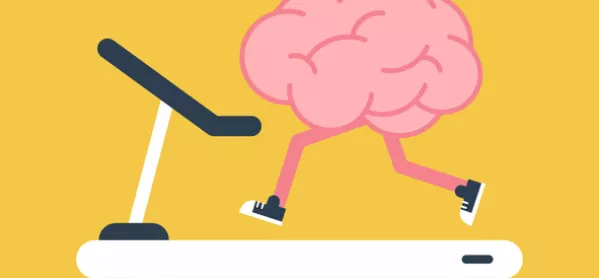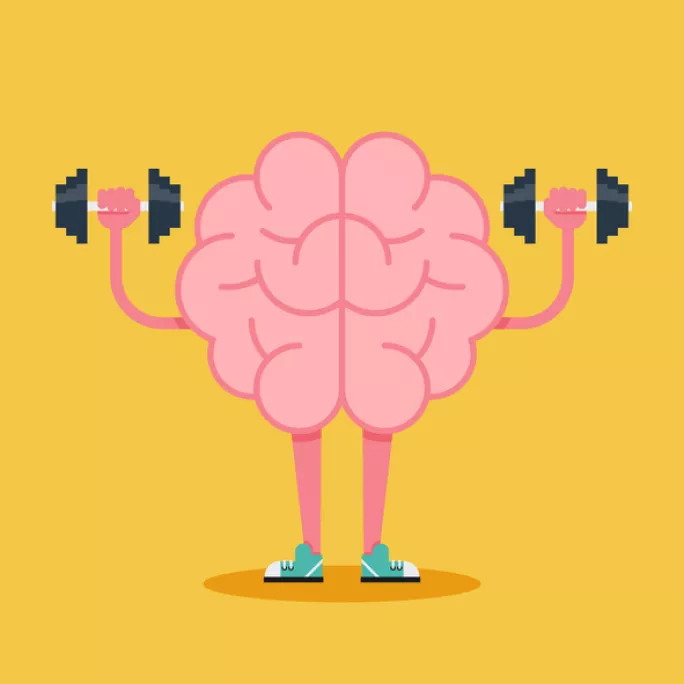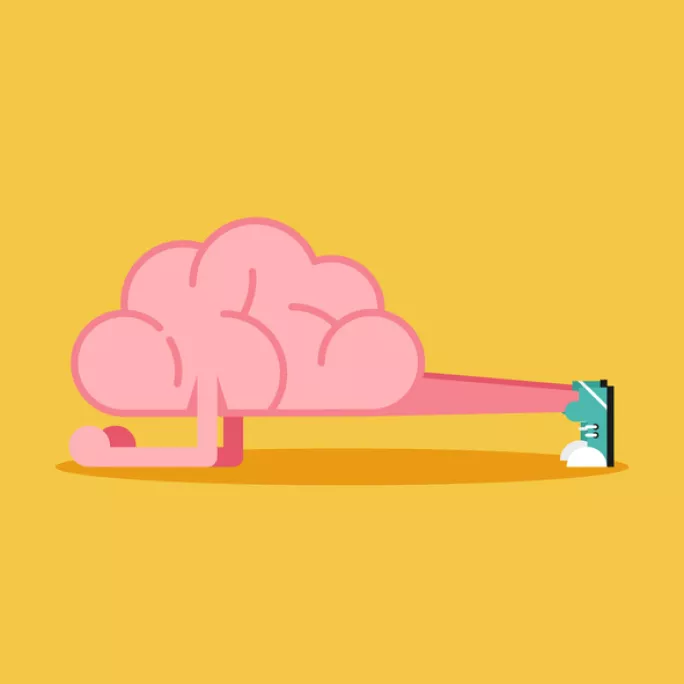Do we all need training in mental fitness?

How mentally fit are you? Do you think your mental fitness has improved over the past year or declined? How many hours do you dedicate to improving your mental fitness in comparison to, say, your physical fitness?
If your answer to the latter is a befuddled “none”, you’re not alone.
More than ever before, our society is openly discussing mental ill-health. People in public positions aren’t afraid to speak up about the challenges they face, prolific campaigns like Mental Health Awareness Week and World Mental Health Day have a huge reach, and there has been a big push for mental health first aiders to be embedded in business across the country, including in the education system.
Need to know: Five ways to support students at risk of suicide
Background: 17,000 college students receive regular counselling
David Gallagher: Meet the man on a mission to transform exam boards
Young people - and the education staff who teach them - are more equipped than ever before to seek support, and are doing so in their thousands. But with resources stretched - and as the long-lasting effect of the pandemic takes hold - it can often feel like college staff are constantly putting out fires, rather than preventing them in the first place.
But this year around 80 colleges have been trialling something different: a mental health platform focused on preventing crisis points, on building resilience, embedding coping mechanisms and, ultimately, improving the mental fitness of everyone in the college community.
Mental health: The seven skills key for mental fitness
So, what exactly is mental fitness, and how does this work?
Mental fitness is all about developing seven key skills: connection, stress, meaning, positivity, focus, motivation and confidence, and through a learning platform developed by Fika, students and staff can access five-minute “booster courses” that build on those skills. The idea is that once you have those seven skills, you will be more equipped to deal with mental health challenges, and stop them from becoming a crisis.
The learning platform was originally developed as an app to use within universities, but when David Gallagher joined NCFE as chief executive, he was keen to take real action on developing mental health skills in further education. And upon being introduced to Fika, he offered funding to around 80 colleges to trial the platform for free.
Right now, more than ever, college communities need to be mentally fit, says Gallagher.
“When I arrived at NCFE, it was the first time I’d ever really looked in a lot of detail at the curriculum within technical and vocational and within tertiary education. And if I’m honest, I was horrified, actually, there was a lack of hardwiring of this stuff [skills like adaptability, resilience, emotional intelligence] into the curriculum: it was English, maths, digital vocational and technical, which, of course, is hugely important, but unless you’ve got those meta skills, well, actually, are you really going to survive and thrive in the way the world works now?
“We thought it was a brilliant idea generally and during a lot of research with college and provider leaders and students, it was apparent that people would need additional support to get them back up to a reasonable level of mental fitness, and beyond.
“[Skills like] adaptability and resilience come through being mentally fit and healthy. So, for us, it was something, as an educational charity first and foremost and considering the impact of the pandemic, that felt like the right thing to do to put some of our resources into trying to get this out there to as many learners as possible.”

‘A comfort blanket’ for college students
So what difference has it made to students and staff this year?
Cat Draper is the principal at Kidderminster College, which is part of the NCG colleges group - and has led the rollout of the learning platform in the past 18 months. She says it’s been like a “comfort blanket” for students.
“There has been more open discussion about mental fitness, and it’s a concept that our students understand, which is really positive. There’s always going to be work to do in relation to 16- to 18-year-olds to get them to engage in mental heath provision, but, anecdotally, the students who access us for mental health issues - and caseload has gone up quite staggeringly in the last year - do tell us, actually, Fika can work like a comfort blanket or a scaffold: something they can go to if they’re really struggling with something,” she says.
“It’s almost a bit like headspace, it works for them in terms of taking themselves out of a situation. They’ll watch a video, or they’ll take themselves through one of the podcasts. And, actually, it can support them while they’re in crisis or haven’t got access to college mental health services, at weekends or in the evenings. The feedback from the students is really good.”
Draper says the short, sharp exercises - ranging from one minute to five minutes - are used consistently throughout the college in all lessons, online or offline, and in all tutor groups.
“We embedded the resources in all of our Microsoft Teams lessons, and now in our classrooms. It can be in any lesson: you could be in GCSE English and the teacher will get everybody to get their smartphones out and do the one-minute ‘Thought of the Day’ piece, or they will use it as a discussion topic or starter activity,” she says. “Students are really quite motivated towards doing it. In the early stages, we did student focus groups with Fika, and asked students what they wanted to see in the resources.”
Draper says the students were very keen to be able to connect with others anonymously, especially during the first lockdown. As a result, a chat function was built in for them to allow them to talk to their peers openly and honestly about their mental health. They also asked for resources on staying positive, even when it felt as though the world was falling apart.
“We saw a major impact on our students’ mental health throughout lockdown, in terms of their concerns about their life after the pandemic, and the opportunities they might have. For example, those students who were on our travel and tourism course were really quite negative and downhearted about the fact they had ambitions to go into a sector which was in free-fall,” she says.
“Being able to use the resources around positivity, recognising what you’re in control over and what you’re not in control of, while also looking at strategies for change, and dealing with changing circumstances with something was so useful at a point in time where you had huge numbers of learners, who had already made quite difficult and focused decisions about what sector they were going to aspire to be in, only to have the rug pulled out from underneath their feet.”
Improving staff wellbeing
And it’s not just the students who are reaping the rewards, says Nick Bennett, co-founder of Fika. In all colleges using the platform, the relationship starts with staff: they access the courses first, and earn seven certificates in mental fitness. “The platform is as much for staff as for students,” he says.
Draper says she was “staggered” by the uptake from staff using the platform.
“In a very similar way to our students, some of our staff really struggled with lockdown: the worry and the anxiety about Covid, when nobody really knew what was going on, there was a lot of our staff who suffered with anxiety, and then also the stress of having to, for our teachers in particular, pivot within 24 hours, and learn a whole load of new skills in relation to remote delivery and online teaching,” she says.
And when colleges returned in September, NCG, as a group, held a “staff bounce-back” course, which was all about tackling anxieties around coming back into the building.
“It was about taking anxious staff and getting them ready to actually come back into the building, and to be able to deal with those fears around social distancing, being surrounded by students, having to be in a classroom, prior to all of the vaccine rollout - and we had really great feedback,” says Draper.
So is mental fitness here to stay in our colleges? Definitely, says Bennett, and going forward, the company has set a target to get all resources uploaded to a desktop-accessible site, to ensure everyone benefits, including those who don’t have personal digital devices.

Investment for boosting mental health
But for mental fitness to truly be accessible to the entire sector, Bennett says the government should ring-fence investment.
“The government should be thinking about subsidising this area, and it should certainly be valued more. We’re on a drum-banging mission with NCFE, we’ve been doing roundtables and speaking to the sector, the government about what are we all going to do collectively about the general lack of mental health and fitness literacy across the country, it’s just not sustainable to ignore it,” he says.
“Culturally, the UK is still seeing mental health as an area of desperate deficit, and therefore thinking of the crisis, and mitigation of problem, rather than recognising that the real problem behind the problem is a fundamental education gap that everyone should have as a right. They should have education as importantly, and as often, as maths and English.”
With or without ring-fenced funding for the government, Gallagher says NCFE would definitely dedicate funding to the project again, and personally he is committed to promoting preventative mental fitness as a way of tackling the mental health crisis.
“If you think about mental health first aid, the fact it’s called ‘first aid’ means something has gone wrong. So should we wait for something to go wrong before we do something about it? I think mental health first aid is absolutely fantastic, but surely, like within our general broad health and safety strategy when we have things happening, we look at the root cause,” says Gallagher.
“It’s about thinking about this as fitness: the analogy I’ve used a few times is, how many of us would just walk out the door and win a marathon? I know what would happen to me, I wouldn’t get very far. But life is a marathon: you don’t really get to stop and we’re not getting the same rest and recreation as we might have got previously and it’s pretty intense. It’s full-on with a lot of things at home, at work, so how do we get fit, to be able to deal with the marathon in this life? It flipped my thinking about it, and I know, in the same way, I need to work on my physical fitness regularly. If I want to stay reasonably healthy, I should be working on my mental fitness as well.”
You need a Tes subscription to read this article
Subscribe now to read this article and get other subscriber-only content:
- Unlimited access to all Tes magazine content
- Exclusive subscriber-only stories
- Award-winning email newsletters
Already a subscriber? Log in
You need a subscription to read this article
Subscribe now to read this article and get other subscriber-only content, including:
- Unlimited access to all Tes magazine content
- Exclusive subscriber-only stories
- Award-winning email newsletters